情态动词
图片预览

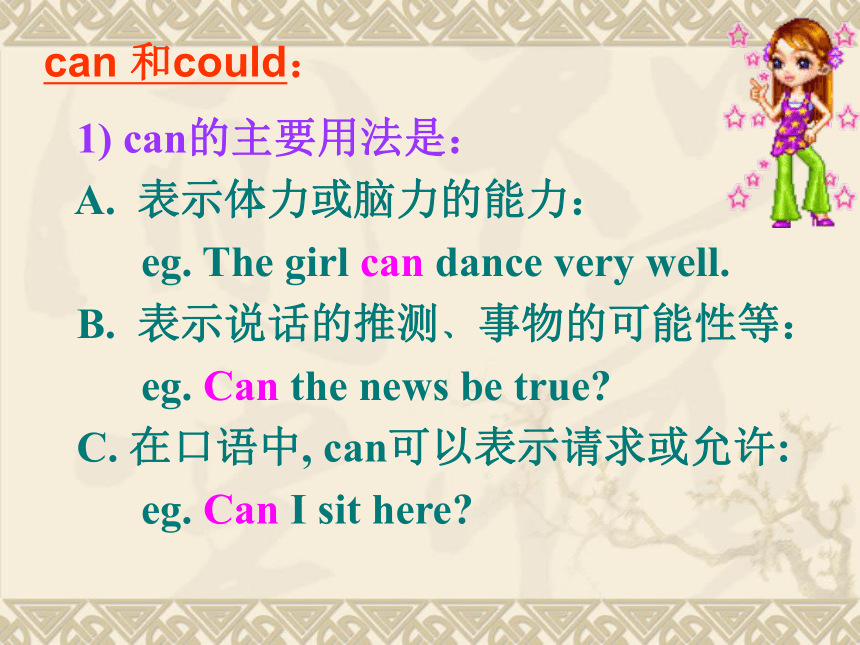
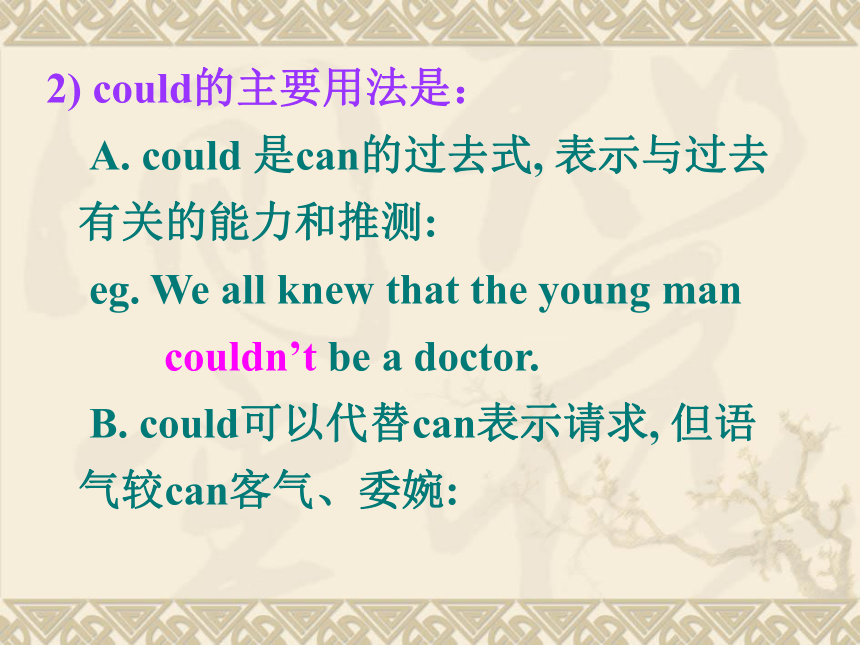
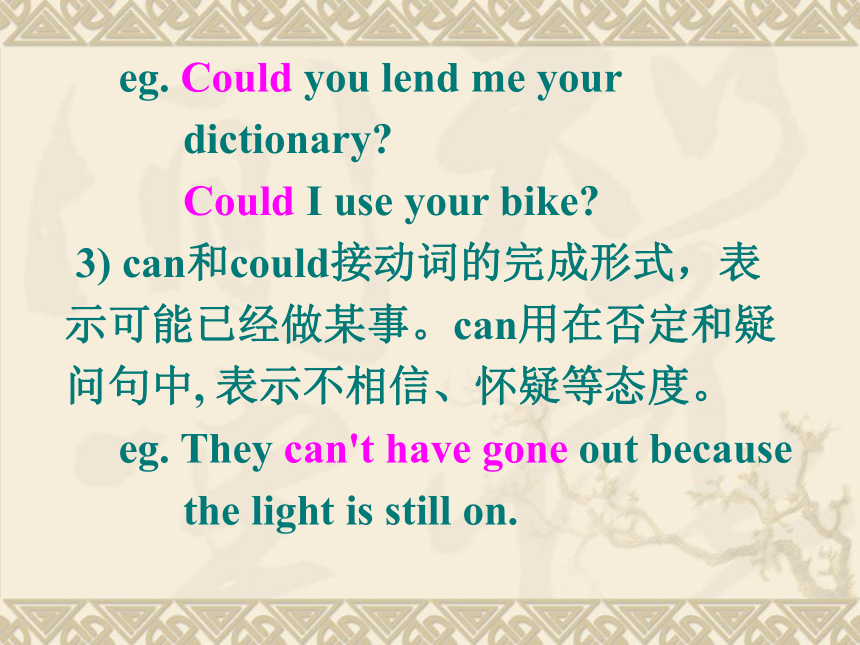
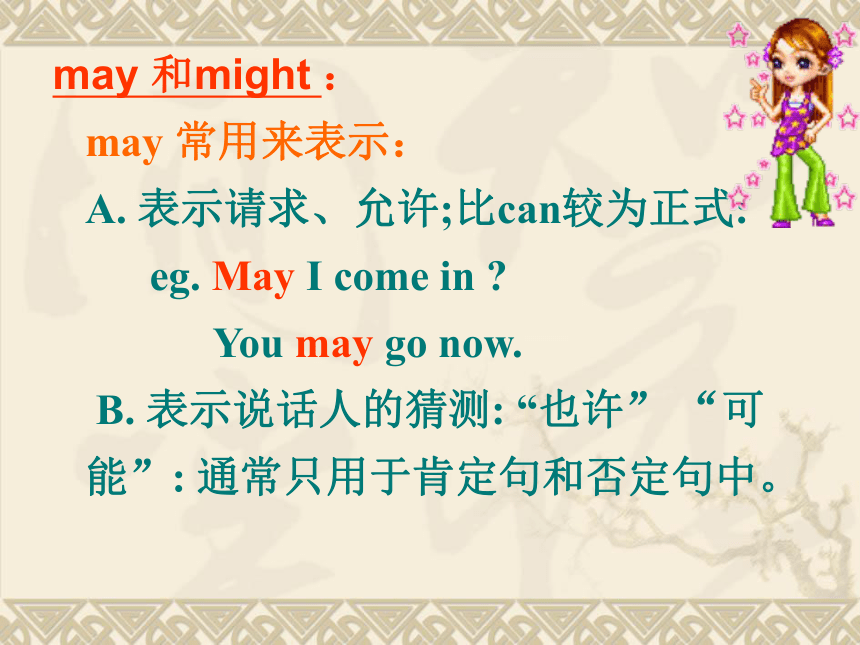
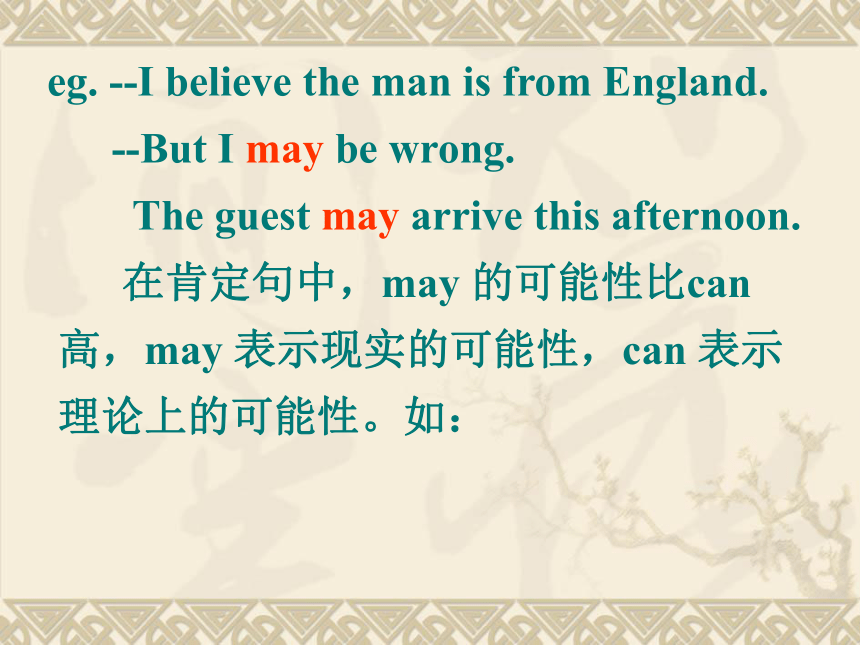
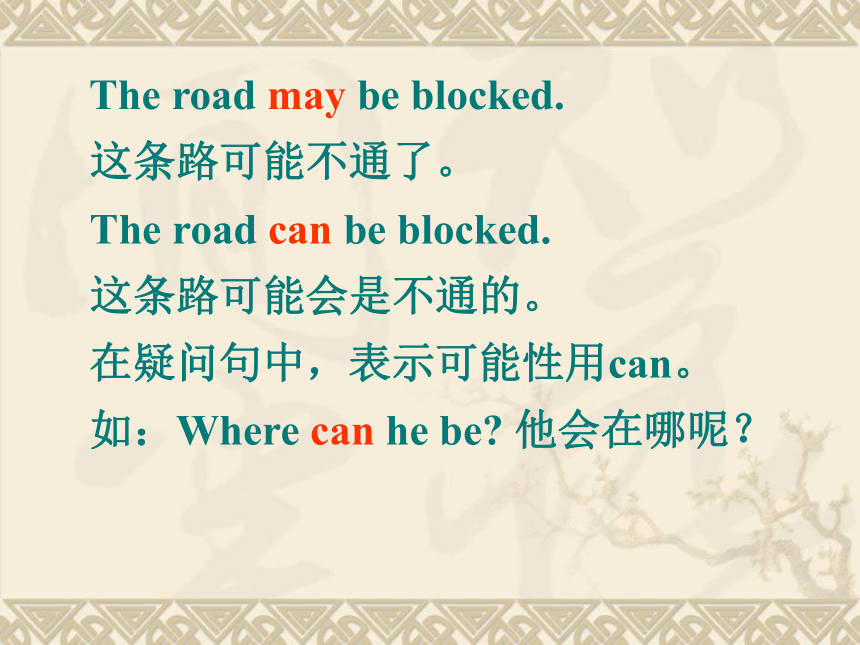



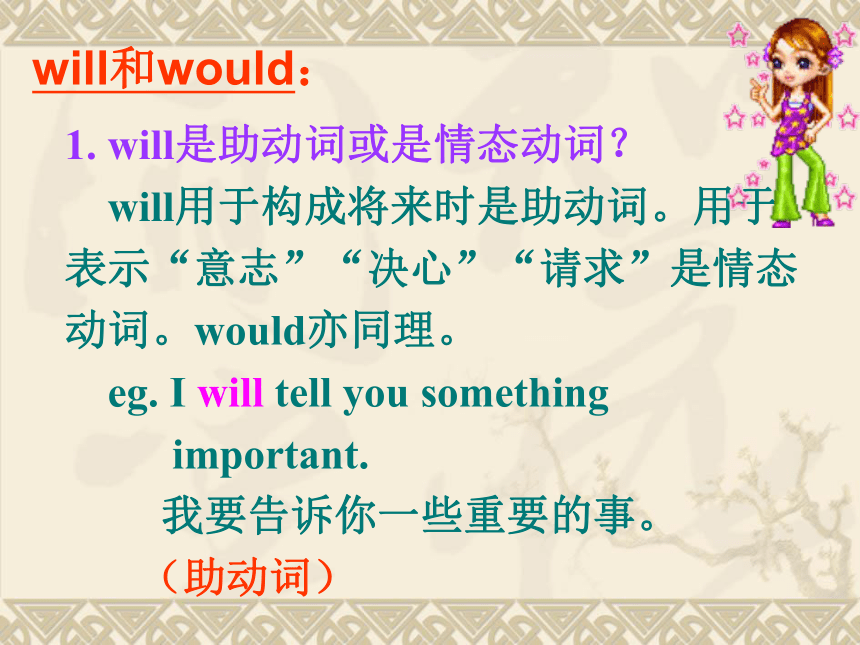
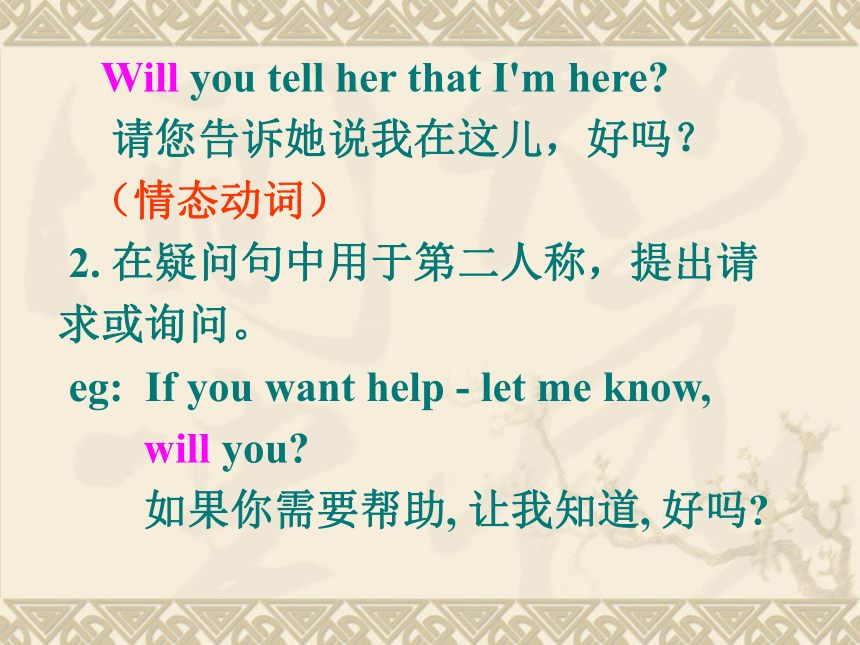
文档简介
课件30张PPT。情态动词用法 1) can的主要用法是:
? A.? 表示体力或脑力的能力:
? eg. The girl can dance very well.
B.? 表示说话的推测﹑事物的可能性等:
eg. Can the news be true?
C. 在口语中, can可以表示请求或允许:
eg. Can I sit here? can 和could:2) could的主要用法是:
A. could 是can的过去式, 表示与过去 有关的能力和推测:
eg. We all knew that the young man
couldn’t be a doctor.
B. could可以代替can表示请求, 但语气较can客气、委婉: eg. Could you lend me your
dictionary?
Could I use your bike?
3) can和could接动词的完成形式,表示可能已经做某事。can用在否定和疑问句中, 表示不相信、怀疑等态度。
eg. They can't have gone out because
the light is still on.may 和might :
may 常用来表示:
?A. 表示请求、允许;比can较为正式:
?? eg. May I come in ?
You may go now.
B. 表示说话人的猜测: “也许” “可能”: 通常只用于肯定句和否定句中。 eg. --I believe the man is from England.
--But I may be wrong.
The guest may arrive this afternoon.
在肯定句中,may 的可能性比can 高,may 表示现实的可能性,can 表示理论上的可能性。如: The road may be blocked.
这条路可能不通了。
The road can be blocked.
这条路可能会是不通的。
在疑问句中,表示可能性用can。
如:Where can he be? 他会在哪呢? C. 表示祝愿;但语气较正式:
eg. May you succeed!
May you have a good journey!
might 的用法有:
多在间接引语中表示过去的可能和允许。如:
She said that he might take her bike.
她说他可以拿她的自行车去用。 除了在间接引语中以外,might 一般不表示过去的可能或者许可。如要表示过去的可能可以用could, 表示过去的许可可以用was( were) allowed to 或者 had permission to 。
表示现在的可能,其可能性要比 may 小。如: She might go home tomorrow.
说不定他明天会回家。
表示现在的许可,语气比may 较委婉,一般用于疑问句(包括间接疑问句),不可用于肯定句或者否定句。
如: Might I have a word with you?
我可以和你说句话吗?will和would: 1. will是助动词或是情态动词?
will用于构成将来时是助动词。用于表示“意志”“决心”“请求”是情态动词。would亦同理。
eg. I will tell you something
important.
我要告诉你一些重要的事。
(助动词)? Will you tell her that I'm here?
请您告诉她说我在这儿,好吗?
(情态动词) ?
2. 在疑问句中用于第二人称,提出请求或询问。
eg: If you want help - let me know,
will you?
如果你需要帮助, 让我知道, 好吗?
?
Will you type this, please?
请打印这个,好吗? ?
Won't you sit down?
请坐下,好吗?
3. would比will客气委婉。
eg: Would you help us, please?
请您帮助我们,好吗?(表请求)I’d go there with you.
我要和你一块到那儿去。?
Teacher wouldn’t allow it.
老师不会允许这件事。(表意愿)(表许可)shall和should: 1. shall用于构成将来时是助动词。
shall用于征求对方的意见,表示 “决心” 是情态动词。
eg: Perhaps I shall pay a visit to
England this winter.
可能今年冬天我会去英国观光。
(构成一般将来时, 助动词) Shall we go by train, Mom?
妈妈,我们乘火车去好吗?
(用于征求对方的意见,情态动词)
I shall go at once.
我必须立即去。
(表 “决心”,情态动词)
2. should表示义务、建议、劝告,意为 “应该”。 “should+ have+过去分词”
表示本应该在过去做但没有做。
eg: You should keep your promise.
你应该遵守诺言。
She should have passed the exam.
她应该通过考试的。must 的主要用法: 1. 表示必然性。
eg: We must all die.
人总要死的。
2. 表示强制或者义务。
eg: You must get up early.
你必须早起来。 注意: must not 的意思是不许可,不应该或者禁止。
如:We mustn’t waste our time. ---- May I take this magazine out? ---- No, you mustn’t.
must 用于一般疑问句的时候,肯定回答应该用yes, please 或者 I’m afraid so, 其否定回答应该用 needn’t 或者 don’t have to。如: 表示推测,语气非常肯定,近乎确定的意味,一般用在肯定句。
如:It must be eleven o’clock now. He must be crazy.
在表示推测的否定或者疑问句中必须用 can, 不可以用 must。 If Mary didn’t leave here until five o’clock, she can’t be home yet.
如果玛丽五点才离开这儿,他此时一定还未到家。 2. A: ______ Xiao Feng find the origin of Easter from that book?
B: No, he _____________. 1. A: ______ you like to go to a special event with us on Saturday?
B: Yes, I _____________________ _________.Would’d like to go with you on SaturdayCouldcouldn’t find itExercise 3. A: _____ I go with my friend to the harvest festival?
B: Yes, you _________________ ________. 4. A: If I want to be a doctor _______ I study science?
B: Yes, you __________________. should study scienceMay may go ( with your shouldfriends )5. A: He is very handsome. ____ he play the role of the prince?
B: No, he _______________________ ______. can’t play the role of theCanprince 6. A: The neighbour’ s children are older this year. _______________ they stop playing tricks at Halloween?
B: Perhaps, they __________ ________________________.
__________________________
____________.Mightor Shouldmight stopor should stop playing tricksplaying tricks at Halloweenat Halloween ----____ I go out to play, mum?
----No, you___. You should do your
homework first.
A. Might; wouldn’t
B. May; had better not
C. Must; mustn’t
D. Need; mustn’tB2. ---Where is Emma?
---I can’t say for sure where she is,
but she___ be out shopping.
A. can
B. should
C. must
D. mayD3. The room is in a terrible mess; it
____ cleaned.
A. can’t have been
B. couldn’t be
C. may have been
D. would be
A4. How____ you say that you really
understand the whole story if you
have covered only part of the article?
A. can
B. must
C. need
D. mayA5. There ____ be any difficulty about
passing the road test since you have
practised a lot in the driving school.
A. mustn’t
B. shan’t
C. shouldn’t
D. needn’t
C
? A.? 表示体力或脑力的能力:
? eg. The girl can dance very well.
B.? 表示说话的推测﹑事物的可能性等:
eg. Can the news be true?
C. 在口语中, can可以表示请求或允许:
eg. Can I sit here? can 和could:2) could的主要用法是:
A. could 是can的过去式, 表示与过去 有关的能力和推测:
eg. We all knew that the young man
couldn’t be a doctor.
B. could可以代替can表示请求, 但语气较can客气、委婉: eg. Could you lend me your
dictionary?
Could I use your bike?
3) can和could接动词的完成形式,表示可能已经做某事。can用在否定和疑问句中, 表示不相信、怀疑等态度。
eg. They can't have gone out because
the light is still on.may 和might :
may 常用来表示:
?A. 表示请求、允许;比can较为正式:
?? eg. May I come in ?
You may go now.
B. 表示说话人的猜测: “也许” “可能”: 通常只用于肯定句和否定句中。 eg. --I believe the man is from England.
--But I may be wrong.
The guest may arrive this afternoon.
在肯定句中,may 的可能性比can 高,may 表示现实的可能性,can 表示理论上的可能性。如: The road may be blocked.
这条路可能不通了。
The road can be blocked.
这条路可能会是不通的。
在疑问句中,表示可能性用can。
如:Where can he be? 他会在哪呢? C. 表示祝愿;但语气较正式:
eg. May you succeed!
May you have a good journey!
might 的用法有:
多在间接引语中表示过去的可能和允许。如:
She said that he might take her bike.
她说他可以拿她的自行车去用。 除了在间接引语中以外,might 一般不表示过去的可能或者许可。如要表示过去的可能可以用could, 表示过去的许可可以用was( were) allowed to 或者 had permission to 。
表示现在的可能,其可能性要比 may 小。如: She might go home tomorrow.
说不定他明天会回家。
表示现在的许可,语气比may 较委婉,一般用于疑问句(包括间接疑问句),不可用于肯定句或者否定句。
如: Might I have a word with you?
我可以和你说句话吗?will和would: 1. will是助动词或是情态动词?
will用于构成将来时是助动词。用于表示“意志”“决心”“请求”是情态动词。would亦同理。
eg. I will tell you something
important.
我要告诉你一些重要的事。
(助动词)? Will you tell her that I'm here?
请您告诉她说我在这儿,好吗?
(情态动词) ?
2. 在疑问句中用于第二人称,提出请求或询问。
eg: If you want help - let me know,
will you?
如果你需要帮助, 让我知道, 好吗?
?
Will you type this, please?
请打印这个,好吗? ?
Won't you sit down?
请坐下,好吗?
3. would比will客气委婉。
eg: Would you help us, please?
请您帮助我们,好吗?(表请求)I’d go there with you.
我要和你一块到那儿去。?
Teacher wouldn’t allow it.
老师不会允许这件事。(表意愿)(表许可)shall和should: 1. shall用于构成将来时是助动词。
shall用于征求对方的意见,表示 “决心” 是情态动词。
eg: Perhaps I shall pay a visit to
England this winter.
可能今年冬天我会去英国观光。
(构成一般将来时, 助动词) Shall we go by train, Mom?
妈妈,我们乘火车去好吗?
(用于征求对方的意见,情态动词)
I shall go at once.
我必须立即去。
(表 “决心”,情态动词)
2. should表示义务、建议、劝告,意为 “应该”。 “should+ have+过去分词”
表示本应该在过去做但没有做。
eg: You should keep your promise.
你应该遵守诺言。
She should have passed the exam.
她应该通过考试的。must 的主要用法: 1. 表示必然性。
eg: We must all die.
人总要死的。
2. 表示强制或者义务。
eg: You must get up early.
你必须早起来。 注意: must not 的意思是不许可,不应该或者禁止。
如:We mustn’t waste our time. ---- May I take this magazine out? ---- No, you mustn’t.
must 用于一般疑问句的时候,肯定回答应该用yes, please 或者 I’m afraid so, 其否定回答应该用 needn’t 或者 don’t have to。如: 表示推测,语气非常肯定,近乎确定的意味,一般用在肯定句。
如:It must be eleven o’clock now. He must be crazy.
在表示推测的否定或者疑问句中必须用 can, 不可以用 must。 If Mary didn’t leave here until five o’clock, she can’t be home yet.
如果玛丽五点才离开这儿,他此时一定还未到家。 2. A: ______ Xiao Feng find the origin of Easter from that book?
B: No, he _____________. 1. A: ______ you like to go to a special event with us on Saturday?
B: Yes, I _____________________ _________.Would’d like to go with you on SaturdayCouldcouldn’t find itExercise 3. A: _____ I go with my friend to the harvest festival?
B: Yes, you _________________ ________. 4. A: If I want to be a doctor _______ I study science?
B: Yes, you __________________. should study scienceMay may go ( with your shouldfriends )5. A: He is very handsome. ____ he play the role of the prince?
B: No, he _______________________ ______. can’t play the role of theCanprince 6. A: The neighbour’ s children are older this year. _______________ they stop playing tricks at Halloween?
B: Perhaps, they __________ ________________________.
__________________________
____________.Mightor Shouldmight stopor should stop playing tricksplaying tricks at Halloweenat Halloween ----____ I go out to play, mum?
----No, you___. You should do your
homework first.
A. Might; wouldn’t
B. May; had better not
C. Must; mustn’t
D. Need; mustn’tB2. ---Where is Emma?
---I can’t say for sure where she is,
but she___ be out shopping.
A. can
B. should
C. must
D. mayD3. The room is in a terrible mess; it
____ cleaned.
A. can’t have been
B. couldn’t be
C. may have been
D. would be
A4. How____ you say that you really
understand the whole story if you
have covered only part of the article?
A. can
B. must
C. need
D. mayA5. There ____ be any difficulty about
passing the road test since you have
practised a lot in the driving school.
A. mustn’t
B. shan’t
C. shouldn’t
D. needn’t
C
